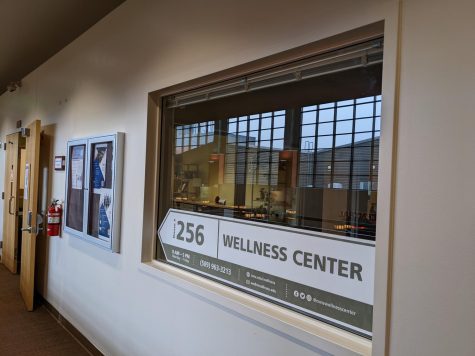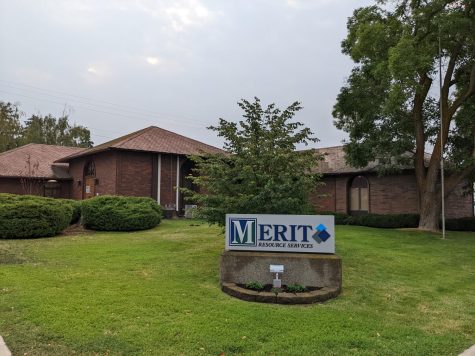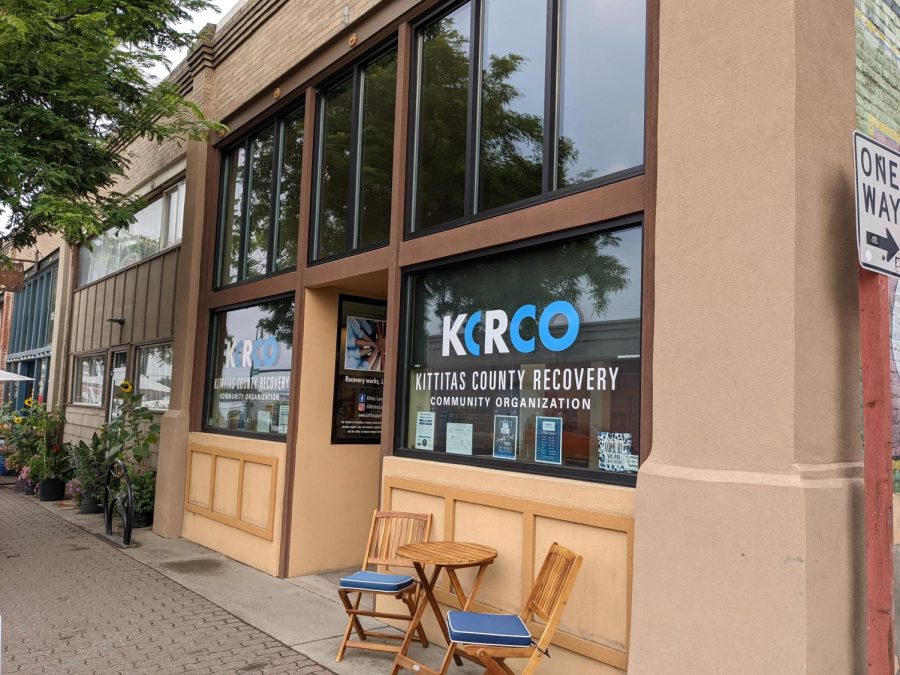Breaking the Stigma: Substance Use Disorders
Local recovery groups share resources for National Recovery Month
The Kittitas County Recovery Community Organization, 211 W 3rd Avenue.
September 12, 2022
Substance Use Disorders (SUD) exist everywhere and can often go untreated, affecting 20.4 million people in the U.S. in the past year, according to the National Institute on Drug Abuse.
Overdose has impacted Ellensburg, with 6 people passing away from overdose in the first 9 months of 2021, according to Kittitas Valley Healthcare’s 2022 report.
According to the Diagnostic and Statistical Manual-5, when recurring use of alcohol or drugs causes health concerns, disabilities or lack of function in daily life, it constitutes a substance use disorder.
The diagnosis is “based on evidence of impaired control, social impairment, risky use and pharmacological criteria.”
The recovery community in Ellensburg includes a variety of groups that collaborate to help residents and employees alike find hope through substance use, such as Merit Resource Services, the Kittitas County Recovery Community Organization (KCRCO) and on-campus resources through the Wellness Center or Student Counseling Services.
Student Perspective
An anonymous student in the master’s program for higher education administration came forward to share their own experience with alcoholism and addiction to marijuana.
“For the longest time I was just a straight alcoholic,” the source said. “I didn’t care what happened with my life. There were times when I kept telling myself if I keep drinking like this, I’m probably not going to wake up because my body’s just going to give out on me while I’m trying to sleep or something and I didn’t really care at that time.”
The source said they started using substances in junior high school because they felt a kinship with other people who were smoking and drinking in a way they hadn’t found before.
“When I grew up, I didn’t have a whole lot of friends at first and I had a really hard time trying to find common ground with people in my age group,” the source said. “I started hanging out with skaters and stoners….We didn’t have a clique to hang out with.”
The source said they hung out with this group so they could all be self destructive together.
Later in life, the source said they benefited from joining Alcoholics Anonymous, working with a sponsor and coming to terms with the idea of a higher power.
“You’re not in control of your destiny,” the source said. “You wanting to be in control is the reason you turned to alcohol and marijuana, because you felt like you had no control … There is a higher power. It doesn’t have to be god, doesn’t have to be Buddha or Mohammed or anything like that, it’s just something higher than you that is controlling what is happening in your life.”
The source said after committing to sobriety, their life has only improved and their outlook on life changed significantly.
“I now have a full time job that requires me to be sober, I get drug and alcohol tested,” the source said. “Now I look forward to the challenges in life and I look forward to improving.”
According to the source, after choosing sobriety they were able to expand their network of friends beyond just those who were using substances.
“When I stopped using, people started coming into my life that I did not expect to want to be in my life and be a part of what I do,” the source said. “It’s almost like they can sense that you’re a good person because you’re not like the horrible person you were when you were using.”
The source said they have learned healthier ways to have fun and deal with the ups and downs of life.
“If something happens in life that I struggle with, I know that it’s just passing,” the source said. “I have to formulate a plan and move forward, whereas back in the day I would just drink or use and forget I had problems and all that does is make your problems worse.”
The source said when they first became sober, they were worried they would live a boring life and would sit at home with their cats all day.
“That’s not the case,” the source said. “You have to try to figure out where can I get fun, where can I get enjoyment and fulfillment in life without using, and it’s very possible you just have to be brave enough to do it.”
According to the source, getting sober requires being honest with yourself.
“If you think to yourself, I cant go for a few days without partying with my friends or getting wasted or lighting up a joint… be honest with yourself,” the source said. “That might include going outside your comfort zone. Go to a meeting just to see what it’s like, I guarantee you will find people there you are going to be attracted to in terms of finding help.”
In order to beat addiction, the source recommended thinking about others and how you can be of service to others.
“We are selfish when we’re using, we don’t care about who we hurt or take advantage of or steal from, we just think about ourselves,” the source said. “Think about other people, think about your classmates, your professors, think about your family, think about your dogs and pets.”

Support on campus
According to Doug Fulp, assistant director at the Kittitas County Health Network (KCHN) and CWU alumni, substance use is normalized on campus in a way that overlooks its severity.
“I was a residence halls coordinator working with a lot of freshmen and substance use is always a thing, especially for college students,” Fulp said. “All too often people will say, it’s just their college years, so they’re going to try it and everyone drinks.”
Contrary to this belief, Fulp said many people choose not to use substances. He said there are some college students who already went through SUD in high school and need care coming into a community like a college campus.
“They’ve done the steps they need to to be in recovery, but now they’re in this community that really normalizes use on a regular basis, so how can we support those students in their recovery and be respectful of their stories?” Fulp said.
According to Fulp, a highlight of his career has been helping create a recovery community at CWU.
“It was a collaboration between the Wellness Center, and the Student Health Center and the Student Counseling Center,” Fulp said.
Coordinator of Substance Misuse Prevention and Collegiate Recovery Support, Elizabeth Patti, said the Wellness Center and Student Counseling Services offer individual meetings for students to talk about goals and what support they need with their disorders.
The Wellness Center also offers group meetings for SUD, one on the Ellensburg campus and one virtual meeting so students from all campuses and schedules can participate. Students can email [email protected] to get involved.
Patti mentioned a quote by writer Johann Hari where he said: “The opposite of addiction is connection,” and she said she sees this ring true in her work.
“It’s all about finding your support system that you feel is best for you,” Patti said. “Some people can’t include their family in their recovery journey and that’s hard, so we try to figure out how to best help a student find that connection on campus.”
Patti said the most impactful part of her work is seeing students find strength through connection, and she recommended students join social clubs on campus.
“Students find a lot of power with a healthy balanced lifestyle,” Patti said. “That may be exercise or sports, for some students that may be finding a hobby or interest … It comes down to self care, how are you able to manage your triggers or cravings while they arise.”
Patti said it’s important to match students up with support they personally identify with, whether that is a cultural or religious group or something else.
“You don’t have to struggle alone,” Patti said. “You can find ways to bring power to your life if you so choose to. We have lots of areas on campus that can best support you.”

Resources available in town
Brandi Amundson, certified peer counselor and program manager for the KCRCO, said a highlight of her work is being a positive influence and assisting those with SUD when they’re doing great in recovery or when they’re at a low point and need someone to listen. She said she enjoys providing resources for loved ones of those with SUD.
“I’m a person in long term recovery,” Amundson said. “I’ve been in recovery for 20 years this last February. I have found great excitement in my life … bringing programs to the community here that can be beneficial.”
Amundson said recovery looks different for everybody. Some are in long-term recovery like her, and some are interested in a life of recovery.
Amundson refers to people who are actively using substances or wonder what recovery looks like outside of religious programs and 12-step programs as “recovery-” or “sober-curious.”
“They’ll come to events and come to lectures or keep an eye on our updates,” Amundson said. “Sometimes that can lead them to starting their own recovery, or maybe they’re just not ready but they know that we’re here.”
Amundson said feeling “supported and not judged” and “humanized” were critical to her own recovery.
According to Program Manager and Clinical Supervisor at Merit Resource Services, Melissa Denner, this community impacted her drastically.
“The recovery community basically saved my life and gave me a life worth living,” Denner said. “It provided a life for my children in which that cycle of addiction and mental illness and dysfunction was broken. Professionally and personally, I’ve seen hundreds of people be rescued from a life of addiction, from jails and death and trauma and despair.”
Denner said Merit is an outpatient SUD treatment facility that offers a 12-step based Cognitive Behavioral Therapy outpatient treatment, as well as walk-in assessments and outpatient programs that vary based on individual needs.
Denner’s work includes starting a Recovery Navigator program at Merit, which offers state-funded peer-to-peer support for those with SUD from peer support counselors who have lived experience with addiction and being in remission according to Denner.
Denner said the Recovery Navigator program will be available to any community members beyond just those being treated by Merit.
“We are helping people get stable housing, find employment, learn communication skills, have that peer-to-peer support, have someone to talk to about challenges in their life,” Denner said.
Denner said the social service system can be hard to navigate for people battling mental illness and SUD. Peers can go to doctor’s appointments or meetings with those who sign up, help them talk to professors or role play conversations with them.
Megan Clausen, a CWU alumna and administrative assistant for the KCRCO, said she started working there because of her family life.
“My dad is in recovery, six years sober,” Clausen said. “Involving the family and educating the family is one of the main things that can help the individual stay sober.”
Clausen said she has learned a lot about barriers within the recovery community and ways to make it more accessible.
Clausen said the barriers she most often sees for those with SUD are difficulties receiving housing assistance and difficulties finding employment.
“We just hosted an employment summit which housed the prosecutor in town, people from the jail, and other employers in the community,” Clausen said. “We provided lunch and taught them about why it’s so important to employ people in recovery, because they’re extremely reliable and dependable people.”
Clausen said people in recovery might have issues with scheduling because they attend court and meetings that would require flexible work hours.
“We discussed some of those things and let employers know if they give them flexible hours, they will provide you good work,” Clausen said. “We are advocates for our peers who come in.”
Clausen said the KCRCO can connect community members with care providers and help them get accepted into treatment.
Various approaches to recovery
The KCRCO offers free recreational activities including yoga, crochet, a book club, an embroidery club and art recovery classes.
“They’re open to anybody in recovery or recovery-curious or a friend of somebody in recovery,” Clausen said.
Some with SUD take a religious or faith-based approach to recovery as seen in programs like Alcoholics Anonymous and Narcotics Anonymous.
Others separate religion from recovery, and some may even separate the need to focus directly on recovery from the recovery process.
According to Amundson, focusing on recovery all the time can be overwhelming and the recreational activities offered through the KCRCO are one way to participate without talking directly about it.
“If you want to come and knit a hat and not talk about your recovery at all, you’re still doing that in a safe environment with other people in recovery,” Amundson said.
“There is hope,” Denner said. “Reach out… There truly is a thriving recovery community in Kittitas County.”
Meeting Locations in Kittitas County:
https://www.cwu.edu/news/campus-notices/aa-na-and-smart-recovery-meetings-campus-0
https://kittitascountyrco.org/for-recovery
https://www.kittitascountyaa.org/meetings
https://www.mercercreek.org/celebrate-recovery/
Resources for Support:
Wellness Center: 509-963-3213
Merit Resource Services: (509) 925-9821
Kittitas County Recovery Community Organization: 509-968-5224
Updated for clarity and additional perspectives.

